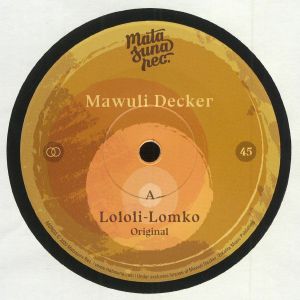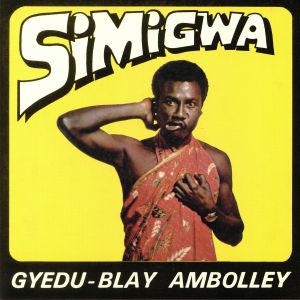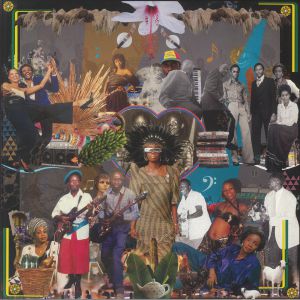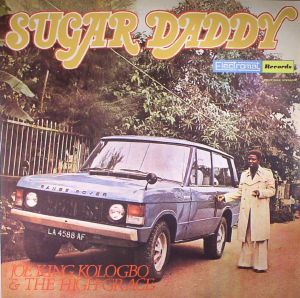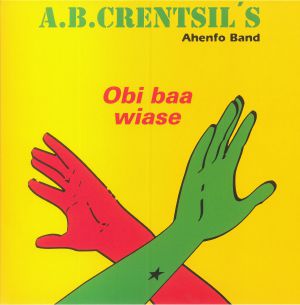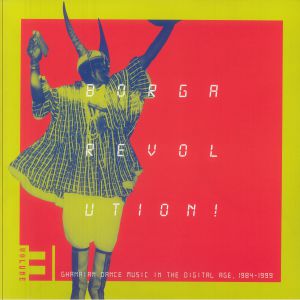Tags: Highlife
Products tagged as HighlifeReview: This latest reissue from Awesome Tapes From Africa is the whole reason for founder Brian Shimkovitz starting the blog and the label that grew out of it. Some 13 years ago, Shimkovitz stumbled across a cassette copy of Obaa Sima whilst travelling Ghana and his love for Ata Kak's music lead to the foundation of the Awesome Tapes From Africa blog and the commencement of a long running effort to track down the Ghanaian musician. Some four years after ATFA became a label, Shimkovitz finally tracked down the musician, real name Yaw Atta-Owusu, and was granted permission to reissue Obaa Sima, using the second hand tape purchased in Ghana as the source. The seven tracks on this LP are a winning tinny combination of highlife, rap, pop, and more with "Daa Nyinaa" sounding like a cover version of William De Vaughn's "Be Thankful For What You've Got".
… Read morePlayed by: Alexis Le-Tan, Charles Maurice, JimmyTheTwin, AfroBase (Radio Chart), Ionik (Traveller Records, KGS), Adam isbell -Racubah Sound System, Sha'D Underground Trax, Dj soFa, Funky Bompa, In Flagranti, Afro Beat Foundation, I Love Disco!, Bastien Carrara, Fulbert, Juno Recommends International, Africa Seven
… Read more in stock ₺1.026,97
in stock ₺497,06
VARIOUS
Cat: STRUT 079LP. Rel: 13 May 11
International
in stock ₺695,78
Cat: PH 45013. Rel: 07 Dec 17
International
Review: Philophon is a Berlin-based label run by Max Weissenfeldt. Part of Philophon is the Tonstudio Bluetenring in Kreuzberg, operated by Benjamin 'Stibbo' Spitzmueller. The label's essential motivation is to support any form of local culture with reason, freedom and ludic drive. North-Ghanaian singer Guy One presents his first international release here. He promises what his name is saying: he is the number one artist of Frafra music, named after his people. "Everything You Do, You Do For Yourself" is a driving Highlife rhythm and his only song having a phrase in English. "Estre" features one of the leading voices of Frafra-Gospel named Florence Adooni. She interweaves perfectly with the horn arrangements by Weissenfeldt and the drummer. Washington's Hailu Mergia, San Francisco's Idris Ackamoor and the Pyramids and the legendary Scandinavian producer Jimi Tenor have also released on the label over the last year too.
… Read more in stock ₺364,58
Samy Ben REDJEB / VARIOUS
Angola Soundtrack 2: Hypnosis Distortions & Other Sonic Innovations 1969-1978 (2xLP + booklet + MP3 download code)
Cat: AALP 075. Rel: 19 May 21
International
Review: A unique political story told in 20 chapters, Angola 2 Soundtrack delves deep into the nine year history of recorded music culture that was born out of the live music oppression set in place by Portuguese rule. Between three labels over 800 recordings were released during this fertile period, each one reflecting Angolan folk and distinctive Latin influences. And these are 20 of the most creative highlights. From the frenetic guitar rhythms and harmonic chants of "Mabele" to the psychedelic highlife shimmers of "Avante Juventude" via the insistent, street-bound sermon of "Snipes", this collection is entrenched in a rich musical history. Complete with well researched booklet and powerful imagery, it's an immaculate lesson in modern music history.
… Read more in stock ₺1.048,70
VARIOUS
Borga Revolution! Ghanaian Dance Music In The Digital Age 1983-1992 Volume 1 (gatefold 2xLP + booklet)
Cat: KALITALP 009. Rel: 17 Jun 22
International
Review: Were you aware of the burger highlife phenomenon that swept through Ghana in the 1980s? Taking the West African sound of highlife and infusing it with the synths and drum machines of disco and boogie, a vibrant fusion culture emerged with hit upon hit of infectious, funky-as-hell party gear undeniably rooted in African culture. This diligent compilation from Kalita looks to some of the most important artists from this wave of electrified highlifers, including Thomas Frempong and George Darko, and of course looking between the cracks for the more obscure gems that should get even the well-schooled excited to check this one out.
… Read more in stock ₺949,61
Review: Those with a deep knowledge of Berlin's Ghanaian ex-pat "burger-highlife" scene may already be familiar with Lee Dodou, a singer who recorded a number of classic singles and albums during the 1980s as part of bands Georg Darko and Kantata. He retired from music in 1991, but has been persuaded to return to action by the Philophon team. This comeback single is pretty impressive all told, with A-side "Basa Basa" - a triumphantly celebratory chunk of 1960s "concert party" highlife rich in punchy horn lines and Dodou's full-throated vocals - being joined on the flipside by the slower, synth-laden "Sahara Akwantou". Brilliantly, the label describes this as "kraut-life" due to its unique (and rather good) fusion of highlife and German kosmiche.
… Read more in stock ₺408,56
VARIOUS
Ghana Special Volume 2: Electronic Highlife & Afro Sounds In The Diaspora 1980-93 (gatefold 3xLP + booklet)
Cat: SNDWLP 148. Rel: 09 May 24
International
Review: New to Soundway Records comes this second edition of Ghana Special, a comprehensive compilation of '80s Ghanaian-diasporic highlife and its embrace of synthesiser and new wave elements. 20 years on from the first compilation in the series, which was released in 2009 and focused on modern and contemporary forms of highlife, this second volume focuses more on tracing the development of the sound as it took on increasingly synthetic forms. The scheme of things goes something like this: drum machines and synthesisers appeared alongside lilting guitar lines and punchy horns, and Ghanaian musicians began incorporating US disco and boogie, r&b, European new wave, and Caribbean zouk and soca into their music. A kind of socioeconomic history lesson conjoins this musicology: the eighties saw unrestricted migration policies in Western nations in the postcolonial era, which enabled new crossover industries to flourish. Thus the music you hear on this compilation was born, and thrived, and continues to thrive.
… Read more in stock ₺1.424,41
No Food Without Taste If By Hunger (remastered) (limited 180 gram orange vinyl LP + MP3 download code in screen-printed sleeve)
Cat: AADE 020. Rel: 03 Mar 23
Funk
Review: No Food Without Taste If By Hunger is the 20th compilation in Analog Africa's Limited Dance Edition series and it also happens to be a mega-rare classic from the world of Edo funk. The Good Samaritans from Benin City, Nigeria released a very small run of the original in 1982. It is an infectious album of hypnotic basslines layered up with trance-like grooves trippy psychedelic guitars that make for an utterly unique kind of funk music. Newly mastered, pressed to 180g vinyl with a silk screen printed cover, and limited to just 2000 copies, this is a rare chance to own such a landmark album.
… Read more in stock ₺1.214,56
Review: Spanish reissue label Rocafort present this wonderful slice of highlife from Konkolo Orchestra, this time on nice blue wax as well as a plain black version. It's not exactly clear where, or indeed when, exactly the band came from, but their sound is all you need to worry about. 'Blue G' is a lilting, shuffling message of love and support for future generations, and from the message to the effervescent musicality, it's a no-brainer. On the flip, 'That Good Thing' is an instrumental that spirals outwards on the sweetest keys, joyous brass and dreamy guitar, driven by a pattering drum section to radiate good vibes wherever it's played.
… Read more in stock ₺441,42
Cat: ASVN 068. Rel: 25 Oct 18
International
Review: After forming from the ashes of a lauded jazz group in 1972, Sierra Leone's Afro National went on to release countless killer singles and albums that effortlessly joined the dots between jazz, highlife, funk and more traditional West African sounds. Here, the laudable Africa Seven label celebrates the band's legacy not by gathering together their most famous tracks, but rather cuts with the most insatiable dancefloor chops. The hits come thick and fast, from the punchy Afrobeat/highlife fusion of opener "Jokenge" and the rolling, low-slung goodness of "Mr Who You Be", to the jaunty, celebratory brilliance of the Juju-influenced "Sonjo" and fuzzy sweetness of the compilation's closing track, "Mother In Law" (which, incidentally, is far more enjoyable than any weekend visit from the in-laws).
… Read more in stock ₺396,91
Review: Over the last couple of years, Matasuna Records has developed a tried-and-tested formula. It revolves around finding and licensing killer cuts - think funk, Afrobeat, tropical flavours and Latin beats - and then pairing them with a fresh, floor-friendly re-edit. Their latest find is something of an overlooked gem: a gorgeously sunny 1983 number from Ghanaian musician Mawuli Decker that's piled high with infectious, EWE-language vocals, Highlife guitars, spacey Moog sounds and cute electric piano solos. The accompanying Renegades of Jazz re-edit is pleasingly faithful to its source material, deftly showcasing Decker's brilliant music while beefing up the bass, subtly tightening up the drums and layering on some complimentary hand percussion.
… Read more in stock ₺232,10
VARIOUS
Borga Revolution! Volume 2: Ghanian Dance Music In The Digital Age 1983-1996 (gatefold 2xLP + booklet)
Cat: KALITALP 010. Rel: 09 Mar 23
International
Review: Kalita's Borga Revolution compilations are pure joy, tapping into the boom in electronic music in Ghana in the 80s and 90s. The first volume came out last year and carried work from the likes of Thomas Frempong and George Darko. On this second instalment we get a whole host of new names to bring us more of that West African heat, and the hits just keep spilling out. Check the urgent stomp of 'Soca For Your Pleasure' by Alan Cosmos & His Bam-Baara Soundz, or the rugged soul and deadly grooves bursting out of Pope Flyne Ackah's 'I Think You Are Right (Jepense Que Tu A Raison)'. If you were into the first edition, this is only going to bring you more delights from an overlooked corner of Africa's musical history.
… Read more in stock ₺629,54
Pat Thomas Introduces Marijata (reissue) (Record Store Day 2018) (180 gram vinyl LP)
Cat: MRBLP 158. Rel: 01 May 18
International
Review: We love RSD only for one thing, and that's providing us with inaccessible records that have been snapped-up by Discogs sharks over the years. This timely reissue of Pat Thomas second LP from 1976, the wonderful Marijata, is one such record that has become impossible to find in its original format, and one which allows us to have some access to the highlife beat, one of our biggest loves. While much of this album rests in classic soul and funk, Pat Thomas' Ghanaian influences are loud and present, whether through the guitars, the aesthetics of each instrumental and, of course, the quality of the recording itself. Funk out to some ORIGINAL STYLE. Cop it quick!
… Read more in stock ₺982,46
Duncan BROOKER / VARIOUS
Nigeria 70: No Wahala Highlife Afro Funk & Juju 1973-1987 (gatefold 2xLP)
Cat: STRUT 197LP. Rel: 29 Mar 19
International
Review: As part of their 20th anniversary celebrations, Strut has decided to bring back the compilation series that first put the label on the map: "Nigeria 70". Curated by Duncan Brooker, this latest volume in the series is the first for eight years. It's another history lesson, with Brooker largely focusing on exposing the musical links between the music of Nigeria and Benin. You get a white-hot mixture of Highlife, Afro-Funk and Ju-Ju, mostly hand-picked from albums and singles that are near impossible for mere mortals to find. Interestingly, this edition doesn't just contain heavy cuts from the '70s, but also more synth-powered songs from the 1980s, too. As you'd expect, it makes for terrific listening.
… Read more in stock ₺872,24
Review: 1975's "Simigwa" album not only launched the career of Afro-funk fusionist and eventual Highlife great Gyedu Blay Ambolley, but also inspired a Ghanaian dance craze. The album was co-produced by another Highlife great, Ebo Taylor, and has long been exceptionally hard to find on vinyl. For this official vinyl reissue on Mr Bongo, Ambolley's landmark set has been fully re-mastered for the very first time. It sounds spectacular, with great clarity on the ear-catching brass solos, serious weight to the bass and superb stereo separation. Highlights include - but certainly aren't limited to - the Afro-blues brilliance of "Toffie", the jaunty dancefloor fuzziness of "This Hustling World" and the heavyweight swing of ear-catching opener "Kwaakwaa".
… Read more in stock ₺982,46
Review: A new week means yet another new compilation from Wagram. The French label has become expert at myriad different genres from staples like house and techno to more esoteric world genre niches. This time out they launch a new series that looks into the rich sounds of Afrobeat, first pioneered by the likes of Fela Kuti and his drummer Tony Allen. Neither of them feature here but the four sides of tunes we do get all make for a deep dive into this compelling rhythmical music.
… Read morePlayed by: Afro Beat Foundation
in stock ₺1.114,94
Review: A Dancefloor in Ndola, curated by East African DJ Kampire for Strut Records' 25th anniversary, is a great example at the broad sounds of classic East and Southern African music. With 13 tracks that span genres like Congolese rumba, South African bubblegum, and Zambian kalindula, the compilation pays homage to the rich musical heritage of the region. Kampire's personal connection to the music, shaped by her upbringing in Ndola, Zambia, adds depth to the compilation. Through her own edit of 'Ririmi Rotsombela' and personal liner notes, she traces her links to the music, creating a nostalgic experience for listeners. The compilation not only celebrates well-known artists but also shines a spotlight on women in African music from the 80s, including legends like Pembey Sheiro, Feza Shamamba, and Princesse Mansia M'bila. It's a testament to the diversity and richness of African music history. With its blend of classic tracks and Kampire's personal touch, A Dancefloor in Ndola is more than just a compilation; it's a cultural journey that highlights the beauty and significance of African musical traditions.
… Read more in stock ₺1.026,97
Review: Victoria Osei and Theresa Owusuaa are Ahemaa Nwomkro, which is a phrase that translates as 'queens of Nwomkro.' Nwomkro is an Ashanti style music that influenced Highlife, a style of music closely linked to Kumasi, Ghana's cultural capital and a city in the middle of the jungle. The pair link up with young highlife talents here and the results are pure, good time sounds that trill with energy, pickle rhythms and earthy percussion as well as some subtle synth work that brings a contemporary edge.
… Read more in stock ₺441,42
Roi De L'Agbadja Moderne 1974-1983 (gatefold 2xLP + booklet + MP3 download code)
Cat: AALP 100. Rel: 06 Feb 25
International
Review: Analog Africa is back with a dedicated project celebrating Gnonnas Pedro, the king of Modern Agbadja, and they press it up on a marvellous double album that includes an eight-page booklet with a ton of extra info. This bumper pack features 16 of Pedro's best works, all of which captivated Africa at the time. His vibrant blend of Agbadja, Cuban fon, jerk, highlife and more unique styles, all of which come with vocals sung in Fon, Mina, Yoruba, French, English and Spanish, add up to one hell of a rich sound. A great testament to the artist's extraordinary legacy.
… Read more in stock ₺1.181,18
Review: Majid Soula is someone who uses music as activism. The Algerian-born, Amazigh artist lays down prominent guitar lines with driving drums and snaking synth lines to blend together worldly sounds such as highlife, disco, Kabyle sounds and funk. The sounds become a vehicle for Soula's political message which he delivers with style and wit. The artists says he is someone whose first concern is "to present a quality artistic work in order to contribute, however modestly, to the development and enrichment of our cultural heritage." He does it and then some with this more absorbing of records. It is sure to become a collector's cult classic.
… Read more in stock ₺1.203,43
VARIOUS
Nigeria Special Volume 3: Electronic Innovation Meets Culture & Tradition 1978-93 (gatefold 3xLP + booklet)
Cat: SNDWLP 167. Rel: 21 Nov 24
Funk
Review: The impeccable Soundway Records is back with another essential companion, this time in the form of Nigeria Special Volume 3: Electronic Innovation Meets Culture & Tradition 1978-93, which presents a collection of 19 tracks capturing the unique musical transformation in Nigeria during a pivotal era. This compilation reflects the fusion of drum machines, synthesisers and Western influences like pop, reggae, disco and soul, all blended with traditional Nigerian genres like highlife and juju. It represents a period of innovation where new technology was used to reimagine and refresh cultural sounds and what results is a bold new sounds that is going to be lapse dup by fans of names like Steve Monite and Charles Amoah.
… Read more in stock ₺1.424,41
Caribe: Colombian Singles Series Vol 3 (12" limited to 300 copies)
Cat: GCCOLSING 3. Rel: 06 Mar 24
Deep House
Review: ARN4L2's first-ever solo vinyl project is a doozy. Across five cuts he looks to the dance floor from his own unique perspective and mixes up Congolese soukous, Colombian Bullerengue, Nigerian highlife, Caribbean soca, and good old house music. His style is colourful and psychedelic and it really is fresh across the hurried, skittish percussive rhythms of 'Rompecuero' and deeper Afro-funk and soul of 'Caribe.' 'Kampangola' brings great instrumental displays and 'Papasukus' is pure summer music. A super strong EP from an artist well worth watching this year.
… Read morePlayed by: Galletas Calientes
in stock ₺794,34
in stock ₺720,15
Played by: AfroBase (Radio Chart), THE REFLEX
in stock ₺836,73
Review: "The message was clear: this was not necessarily music for dancing - even though the rhythms were compelling enough. This was music for the thinkers." When it came to the music of Celestine Ukwu, from where was this message communicated? In his case, it was the coalescing of his fashion sense and performance style, which combined unorthodox dress for highlife musicians - turtlenecks and drab coats - with a polyrhythm-focused, less intense highlife sound. With his bands, most notably The Philosophers National, Ukwu pioneered a more pensive and slow-burning version of the West African style, earning his place in musical history and this compilation of his greatest works.
… Read morePlayed by: AfroBase (Radio Chart), Juno Recommends International
in stock ₺838,85
Review: Dan Boadi left his native Ghana to take his highlife sound to American audiences after he had his 1967 breakout debut 'Abrabo'. That was a regional hit and soon after came this tune which was recorded at Paul Serrano's studio in Chicago. It showcased the real breadth and depth of his sound as it called upon reggae, acrobat, halide and funk to demand your ear with a chugging drum groove. Add in the colourful orchestration that makes the tune soar and a you have a record that is a true musical melting pot that stood Boadi pat in his new home of the Windy City.
… Read morePlayed by: Mukatsuku Records Chart, Afro Beat Foundation
in stock ₺386,31
Review: A 10" featuring the finest that highlife has to offer, Crentsil was a figurehead of Ghanian music during the 70s and 80s who was introduced to highlife music at the turn of the 90s - a combination of pop, jazz, disco, and funk. 'Obi Baa Wiase' and 'Sika Be Ba' are two tracks with a close-knit message of gratitude, hope and faith between them, with the former being the staple track of Crentsil's long career after being played at weddings, festivals, and live concerts by local bands. A pair of incredible tracks produced by Charles Amoah utilising limited equipment to create an authentic party atmosphere, jovial flutes and plucky strings are the accompaniment to A.B. Entsils's proclamation of joy - put this on at the party and the room are sure to start moving.
… Read more in stock ₺882,84
Played by: AfroBase (Radio Chart), Juno Recommends International
in stock ₺441,42
Played by: JimmyTheTwin, AfroBase (Radio Chart)
in stock ₺916,22
Review: Ahemaa Nwomkro means queens of Nwomkro, an old Ashanti Musial style that was hugely influential in the early formation of genres like the Highlife take on Kumasi, which is the cultural capital of Ghana in the middle of the jungle. Those queens are Victoria Osei and Theresa Owusua and here they team up with young Highlife musicians generation Akule Pepe on guitar. He worked for many years with Highlife legend Alex Konadu and these songs here show just how well pure Nwomkro work with textbook Highlife.
… Read morePlayed by: AfroBase (Radio Chart)
in stock ₺441,42
Cat: CW 005. Rel: 14 Mar 23
Disco/Nu-Disco
Review: Niels Nieuborg is Arp Frique, an artist who made a bold and brilliant debut on Rush Hour a few years ago and has never looked back since. His 2018 album Welcome To The Colorful World of Arp Frique showed off his fresh take on disco with a host of collaborators and now he once again lays down the beats while various guests appear on this new EP on Colourful World. Elements of zouk, highlife, Afro-disco and many more worldly rhythms lend these cuts their unique and characterful style. Analog drum machines, kick rhythms and psyched out synths all sit next to great vocals for a kaleidoscopic trip like no other.
… Read more in stock ₺529,38
Stage Two (limited 180 gram clear vinyl LP with obi-strip)
Cat: TWM 73LITA. Rel: 04 Aug 21
International
Review: Recorded and initially released in 1976, Stage 2 was one of a trio of killer albums that highlife legend Pat Thomas recorded with the Marjarita backing band. Although amongst his most popular sets in his native Ghana, the album has never been released outside Africa - until now. This remastered edition, which comes pressed on clear vinyl, is therefore long overdue. It remains a superb set all told, with Thomas and his collaborators serving up a fuzzy, sometimes fiery fusion of Afro-Soul, highlife, Afro-funk, rocksteady, reggae and Afro-rock. Thomas is in terrific form throughout, delivering effortlessly soulful and impassioned vocals that turn an otherwise excellent album into a genuinely terrific one.
… Read morePlayed by: AfroBase (Radio Chart), Juno Recommends International
in stock ₺684,65
Cat: COMET 121. Rel: 12 Apr 23
International
Review: Ebo Taylor And The Pelikans were Afro-funk masters of the seventies. Their self-titled 1976 record is one of the most well-regarded and highly sought-after Ghanaian funk offerings and now it gets a high-quality reissue by Comet Records. This album contains the legendary 'Come Along' and is the first time revered artist, arranger, musician and producer Ebo sang the seminal Ghana funk tune. He is joined throughout by the 12-piece Cape Coast collective The Pelikans led by Bessa Simmona with rhythm guitarist Fifi Orleans Lindsay.
… Read morePlayed by: Mukatsuku Records Chart
in stock ₺1.291,93
VARIOUS
Wagadu Grooves Vol 2: The Hypnotic Sound Of Camara 1991-2014 (remastered) (gatefold 2xLP + booklet)
Cat: HTML 011. Rel: 14 Mar 25
International
in stock ₺1.324,26
Lumingu aka ZORRO PUATI
Mosese (180 gram vinyl LP + insert)
Cat: BBE 546ALP. Rel: 08 Oct 19
International
in stock ₺672,99
VARIOUS
Cat: KALITA 012LP. Rel: 22 May 25
International
Review: Kalita returns with the third instalment of its Borga Revolution! series, continuing its deep dive into the sound of Burger Highlife, a genre born of traditional Ghanaian melodies, synths, drum machines, and disco groove-matics. Emerging in the 1980s during a time of great political turmoil, public strife and mass emigration, the style evolved as Ghanaian musicians abroad began blending their roots with the digital tools of their new homes. Volume 3 showcases rare and elusive cuts by the likes of Obibini Takyi, Osei Banahene, and Okyerema Asante, as well as keystone figures George Darko and Lee Dodou. The collection paints a fuller picture of a moment where innovation thrived in exile, and highlife was reshaped through transcontinental influence and technological experimentation.
… Read more in stock ₺1.114,94
Played by: AfroBase (Radio Chart)
in stock ₺349,21
Mi Latinoamerica Sufre (limited LP + insert + MP3 download code)
Cat: BJR 105LP. Rel: 22 Aug 24
International
Review: Mi Latinoamerica Sufre embarks on a musical journey that redefines the electric guitar's role within tropical Latin music. The album, crafted by the Meridian Brothers, draws from the melodious, intricate rhythms of African highlife and soukous guitar bands, popular both in coastal Colombian pico sound system dances and across Africa. Eschewing typical prog or psych rock distortions, the sound embraces a clean, pure approach, honoring '70s Congolese rumba, Ghanaian highlife, and Nigerian afrobeat. The compositions on Mi Latinoamerica Sufre intricately blend Latin rhythms like cumbia, champeta and Brazilian tropicalia with underground psychedelic rock. Through the character Junior Maximiliano the Third, the album delves into themes of self-discovery, humorously navigating through nostalgia, paranoia, and shared experiences. Alvarez's vocal versatility enriches the album's sonic storytelling, complemented by visual narratives from Colombian artist Mateo Rivano. This innovative concept album unfolds as a poignant exploration of identity, offering a fresh perspective on Afro-Latino musical traditions and psychological states.
… Read morePlayed by: Ex-Friendly (Truth & Lies Music)
in stock ₺1.147,79
Cat: AJXLP 729. Rel: 22 Jun 23
International
Review: Acid Jazz Records are master compilers who here turn their focus once more to Les Sympathics De Porto Novo Benin. It's part of the label's reissues series focussing on rare sounds from legendary Benin imprint Albarika Store and is a second album from one of the most notable groups to hail from Porto Novo'. This 1970s collective, founded by Herman Laleye, is famed for its heavy rhythm section and vocals from Gangbo Bonheur, Armand Pognon playing blues-tinged guitar and Camille Zanou's on the organ. Rather than straight-up Afro-beat, Afro-funk or Latin, this band fused it all seamlessly into something new.
… Read morePlayed by: AfroBase (Radio Chart)
in stock ₺838,32
Played by: AfroBase (Radio Chart), Juno Recommends International
in stock ₺949,61
Cat: DTW 012. Rel: 02 Mar 23
International
Review: The late Helen Nkume began her music career in Nigeria in the early 70s, forming the Young Timers and crafting a strain of highlife which caught on in the East of the country. By the late 70s she had self-produced her two best albums, which were constrained to the region she resided in and were of course incredibly hard to come by. The diligent folk at Dig This Way came across those records in a village near Umahia and embarked on a mission to connect with her family, gather any material they could about Nkume and present some of her incredible music to the world, which has resulted in this perfectly formed four-tracker of Afrobeat goodness.
… Read more in stock ₺1.103,81
in stock ₺817,13
Review: Always keen to break new ground, Strut's latest compilation comes not from a well-known European or American crate-digger, but rather Kenyan-born, Uganda-based DJ Kampire. A Dancefloor in Ndola sees her look back to her time growing up in Zambia and specifically the music she heard and loved during these formative years. It's a great idea, executed brilliantly, with Kampire showcasing an enticing and highly entertaining mix of East and South African music from the 70s and 80s, including Congolese rumba and soukous, bubblegum, and kalindula, a guitar-led style native to Zambia. It's a joyous an eye-opening collection all told and notable for - aside from the high quality throughout - Kampire's decision to showcase a high number of tracks from legendary and little-known female artists. A genuinely essential collection all told.
… Read morePlayed by: Juno Recommends International
in stock ₺452,55
in stock ₺1.191,78
Review: Eroya is a Lagos-based collective bridging generations of musicians who trace Nigerian music from the 1940s to today's Naija grooves. Their sound weaves so called styles such as palm-wine, agidigbo, juju, highlife, Afro-funk and Afrobeat traditions. Key members include Sina Ayinde Bakare, son of juju pioneer Ayinde Bakare, juju legend Fatai Rolling Dollar, Afro-funk saxophonist Prince Eji Oyewole and Afrobeat pianist Duro Ikujenyo of Fela Kuti's Egypt 80. Highlights on this album include Alaba Pedro's soulful 'Ekaete', Tejebaby's hypnotic 'Africa', and Oyewole's flute-led 'Experience'. With its bubbling jazz textures and deep rhythmic energy, Eroya is a perfect tribute to Nigeria's enduring musical contributions.
… Read morePlayed by: AfroBase (Radio Chart)
in stock ₺1.302,53
Review: The magnificent Luaka Bop label has been showcasing the work of Alhaji Waziri Oshomah - a master of Afro sounds and rhythms that cut deep - for a while now across several albums and compilations. He hails from Edo State in southern Nigeria and is known for holding sermons of the religious as well as musical sort. After various volumes of work and the superb World Spirituality Classics 3: The Muslim Highlife Of Alhaji Waziri Oshomah record comes this new series of gems that show off his unique take on international rhythms across four long, ever evolving and always engaging grooves.
… Read morePlayed by: AfroBase (Radio Chart)
in stock ₺940,07
Cat: LPWABB 104. Rel: 14 Jan 22
International
Played by: AfroBase (Radio Chart), Juno Recommends International
in stock ₺1.412,75
Played by: Juno Recommends International
in stock ₺1.225,69
VARIOUS
Cat: BBE 791CLP. Rel: 06 Mar 25
International
Review: Prepare yourself for a wry chuckle, as we impart the fact that the compilation you see hyperlinked before you was not at all prepackaged, with work cut out for its curators. Rather, it came from the source, having first manifested as a pile of Ghanaian highlife LPs buried at the bottom of DJ Jerry Frempong's wife's garden. Frempong is the son of one of one of the most prominent former Ghanaian-British label owners, Anthony Roberts Frempong of Asona Records, whose founding movements in the South East London district of Peckham proved highly popular helping disseminate highlife music in the English capital. BBE Music owner Pete Adarkwah caught wind of the serendipitous discovery and approached Jerry to discuss the reissue of this historic catalogue, which you hear here. The sweetest of early and untrodden highlife highlights are heard here, including sparklers by Kantata, Jewel Ackah, Sam Yeboah, Mr Cee and even Thomas Frempong himself.
… Read more in stock ₺1.412,75

 TRY
TRY
















